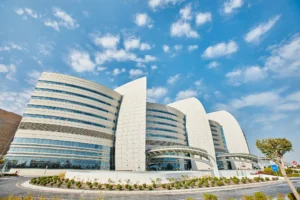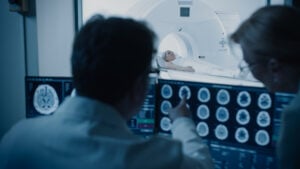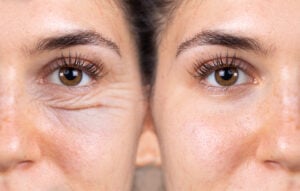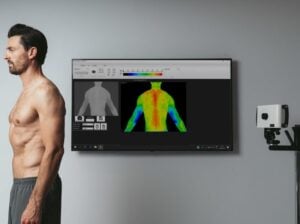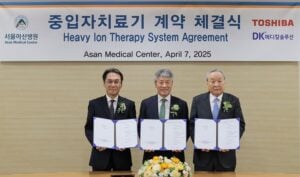Also referred to as immunotherapy or adoptive cell transfer, CAR T-cell therapy is a specialist type of cancer treatment. At the moment, it is being used for childhood leukaemia and adult lymphoma, but it’s also being trialled on other forms of cancer, such as multiple myeloma, potentially expanding its use in the future.
How does CAR T-cell therapy work?
The Chimeric Antigen Receptor (CAR) T-cell works on an individual basis. It uses the patient’s own T-cells (a type of white blood cell) to fight the cancer cells. The T-cells are extracted from the patient’s blood and then changed in the lab (genetically modified to attack a specific protein in cancer cells). The cells multiply in the lab, and once the consultant believes there are enough of them to treat cancer, they are put back into the patient’s bloodstream using a drip. The idea is that the modified T-cells will be able to detect and extinguish the cancer cells. The modified T-cells are designed to stay in the body longer than a ‘natural’ T-cell.
Oncologists and medical teams are excited about this radical new therapy because it has been used to treat advanced cancers where other treatments have failed. That’s because of it’s precision capabilities of targeting cancer cells.
Side effects of CAR T-cell therapy
Like other forms of cancer treatment, this revolutionary new therapy does have side effects, too (some of which can be life-threatening). Examples include:
- Fast heartbeat
- Breathing difficulties
- Fever and chills
- Severe nausea with diarrhoea
- Muscle and joint pain
- Seizures
- Shaking
- Confusion
- Balance difficulties
The good news is that once recognised, medicines are often available to treat these side effects.
Advancing CAR T-cell therapy research
The excitement around CAR T-cell therapies is gaining momentum worldwide. Numerous groups are advancing CAR T-cell therapy research, including an exciting collaboration between India’s IIT Bombay and Tata Memorial Centre. Together, they aim to develop the first indigenous CAR T-cell therapy, offering it at a fraction of US market prices.
Patients have responded positively to the CAR T-cell therapy in clinical trials, and many are still cancer-free a year later. As a result, several specialised treatment centres have been set up to focus specifically on CAR T-cell therapy.
Top 10 CAR T-cell therapy treatment centers
Here is a look at our list of the top 10 leading CAR T-cell therapy centers across Europe, MENA and Asia today.
The Cancer Institute Hospital of JFCR (Tokyo)
As the Cancer Institute Hospital of the Japanese Foundation for Cancer Research (JFCR), this centre is a leader in the country’s CAR T-cell therapy treatment. Significant investments are made in clinical trials here, while staff and patients (many of whom are from overseas) benefit from the latest technology.
National Cancer Centre (Singapore)
The leading location for CAR T-Cell therapy in Southeast Asia, the National Cancer Centre, Singapore, provides innovative clinical trials for this newest of cancer treatments. With a multidisciplinary medical team, experts specialise in both haematology and oncology. It was the first centre in Southeast Asia to be approved for the FDA-registered CAR T-cell therapy for ALL and DLBCL.
The London Clinic (United Kingdom)
Those treated with CAR T-cell therapy at the London Clinic benefit from world-leading oncology and haematology consultant care. The Hospital focuses on personalised treatments and is recognised for its excellence in oncology care. The London Clinic uses CAR-T cell therapy called YescartaTM to treat a type of non-Hodgkin lymphoma called large B-cell lymphoma. This new treatment gives hope to people with no treatment options.
King Faisal Specialist Hospital & Research Center (Saudi Arabia)
King Faisal Specialist Hospital in Saudi Arabia is a leading 2415-bed facility renowned for its expertise in Oncology, Organ Transplantation, and Cardiovascular Diseases. The hospital has treated over 100 patients with advanced CAR-T cell Therapy, offering a pioneering program that extends this specialised treatment to patients in the GCC and beyond.
Samsung Medical Centre (South Korea)
The CAR T-cell Therapy Center at Samsung Medical Center is the only institution in Korea that performs CAR T-cell therapy. Currently, the CAR T-cell Therapy Center offers Novartis’ Kymriah CAR T-cell therapy to patients with diffuse large B-cell lymphoma and B-cell acute lymphoblastic leukaemia patients under 25.
Beijing Cancer Hospital (China)
The Chinese government is committed to funding the advancement of CAR T-cell therapy within the country, with the Beijing Cancer Hospital spearheading intensive research efforts. Over the past nine years, China has seen a significant expansion in CAR T-cell therapy, starting from initial clinical trials in 2013 to now hosting the world’s largest number of CAR T-cell clinical trials, surpassing the US, UK, and Germany.
Chulalongkorn University Cancer Centre (Thailand)
Thailand’s Chulalongkorn University Cancer Centre offers CAR T-cell therapy for children and adults. Its staff is from around the world, giving the centre a very international feel. The centre specialises in the treatment of hematologic malignancies.
All India Institute of Medical Sciences (India)
The All India Institute of Medical Sciences is a premier academic research centre in India and is pioneering CAR T-cell therapy research and treatment. The medical teams here are keen to make the treatment available to all by keeping costs down. With ongoing research, including hundreds of clinical trials, they strive to advance CAR T cell therapies further.
Heidelberg University Hospital, Germany
Heidelberg University Hospital is the first centre in Germany to offer CAR T-cell therapy. It provides state-of-the-art equipment for both domestic and overseas patients. Collaboration between several specialist disciplines ensures the highest treatment standards possible.
Apollo Hospitals, India
Also, in India, Apollo Hospitals is gaining a name for itself in CAR-T cell therapy. Apollo Cancer Centres emerged as the first private hospital group in India to have completed a CAR-T cell program. The group will now provide access to ‘Made in India’ CAR-T cell therapy, beginning with NexCAR19™ (Actalycabtagene autoleucel), for the treatment of B-cell lymphomas and B-acute lymphoblastic leukaemia in patients aged 15 years and above.
About MTM Global
MTM Global is a UK-based international healthcare consultancy and online travel agency specializing in premier health tourism.
If you have a story about healthcare development, innovation and clinical firsts in your country that would appeal to our international readers, please get in touch.
For all corporate and media inquiries, click here.

